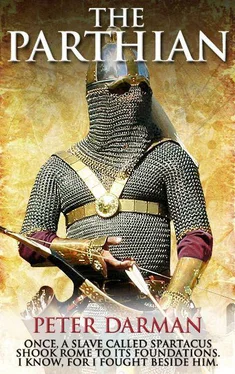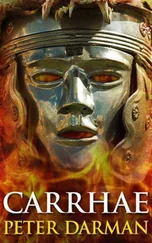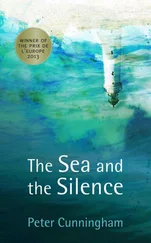Peter Darman - The Parthian
Здесь есть возможность читать онлайн «Peter Darman - The Parthian» весь текст электронной книги совершенно бесплатно (целиком полную версию без сокращений). В некоторых случаях можно слушать аудио, скачать через торрент в формате fb2 и присутствует краткое содержание. Год выпуска: 2011, Жанр: Исторические приключения, на английском языке. Описание произведения, (предисловие) а так же отзывы посетителей доступны на портале библиотеки ЛибКат.
- Название:The Parthian
- Автор:
- Жанр:
- Год:2011
- ISBN:нет данных
- Рейтинг книги:4 / 5. Голосов: 1
-
Избранное:Добавить в избранное
- Отзывы:
-
Ваша оценка:
- 80
- 1
- 2
- 3
- 4
- 5
The Parthian: краткое содержание, описание и аннотация
Предлагаем к чтению аннотацию, описание, краткое содержание или предисловие (зависит от того, что написал сам автор книги «The Parthian»). Если вы не нашли необходимую информацию о книге — напишите в комментариях, мы постараемся отыскать её.
The Parthian — читать онлайн бесплатно полную книгу (весь текст) целиком
Ниже представлен текст книги, разбитый по страницам. Система сохранения места последней прочитанной страницы, позволяет с удобством читать онлайн бесплатно книгу «The Parthian», без необходимости каждый раз заново искать на чём Вы остановились. Поставьте закладку, и сможете в любой момент перейти на страницу, на которой закончили чтение.
Интервал:
Закладка:
‘Do you mention me in this letter?’ asked Gallia.
‘Of course.’
‘And what do you say of me?’
I smiled at her. ‘That I never knew how empty was my life until you filled it.’
She shook her head. ‘Tell me the truth.’
I pulled her close and kissed her. ‘That is the truth. I am nothing without you and I do not wish to live in a world that does have you in it.’
‘Still the dreamer, Pacorus. You should have been a poet rather than a warrior.’
‘Perhaps I will be now that the fighting is done,’ I slapped her behind. ‘That and siring children, of course.’
She suddenly looked serious. ‘You think the Romans will forget you?’
‘I think the Romans will not dare to come to Parthia. If but a handful of Parthians can rampage through their homeland for three years, think of what a whole army and empire could do to them.’
She smiled. ‘Perhaps.’
The voyage east was uneventful and even pleasurable. It was certainly infinitely more enjoyable than my journey to Italy. We were blessed with fine weather and good winds, though several of my Parthians were seasick and several of the horses suffered diarrhoea, which caused the crews to complain bitterly. It was cured when Godarz realised that the beasts were being fed twice their daily intake of hay by sailors wishing to be kind. This was soon stopped and the unpleasant side-effects disappeared. Of the Romans or Cilicians we saw none. When we reached Syria it took us a whole day to offload and horses and acclimatise them to movement once more. The days spent in a stationary position had weakened the muscles and joints in their legs, so once they were hoisted out of the holds and into the sea; each rider spent two hours walking them in the water. That night we camped on the shore and slept on the sand, with the ships anchored in the water.
The next day we said goodbye to Athineos and his crews. Godarz paid the balance owed him and he put one of his massive arms around my shoulders.
‘If you want my advice, young prince, you will stay in Parthia from now on. You’ve brought back a beauty, that’s for sure, so concentrate on keeping her happy and you’ll be fine.’ He suddenly looked serious. ‘Remember, the Romans are like a bad-tempered cobra. You don’t want to antagonise them.’
‘I’ll try to remember that, captain.’ But in truth all I was thinking about was Hatra and my parents.
As we watched the ships disappear over the horizon, I inhaled the air into my lungs. It smelt and tasted like my homeland, and I swore I could smell the spices of the Orient on the eastern breeze. I sent Gafarn and Godarz into Antioch to purchase camels, tents, food and fodder for the horses. Six Parthians went with them for protection. While we waited for them to return, we camped just off the beach beneath a cluster of apricot trees. The day was hot and dry, but we pitched our Roman tents in the shade of the trees and the gentle eastern breeze made our location pleasant enough. Diana, with the infant in her care, and the rest of the Amazons grouped their tens together, while the various races also stayed together. I posted a screen of guards two hundred yards inland from our camp, but we saw no one that day. Antioch was at least ten miles away and Athineos had disembarked us on a stretch of coast that had no villages nearby. Nevertheless, I was worried that his ships had been seen, and I had bad memories of being once surprised on a beach.
In the early evening Godarz and Gafarn returned, bringing two dozen spitting and ill-tempered camels with them, each one loaded with supplies. Many of our party, including Gallia, had never seen a camel before and she was filled with joy, patting their long necks and faces. She found them amusing, but camels take themselves very seriously and do not like to be mocked, and a particularly angry looking one spat in her face, which mortified my love but prompted many of the Parthians to smile. We had learned long ago to treat these beasts of the desert with respect.
‘They are disgusting creatures,’ she said, wiping her face with a towel.
‘Welcome to the East, my sweet.’
We no longer needed the Roman shelters, for that night we slept in tents that were far removed from the Roman variety. Each one was made from strips of cloth woven from goat or camel hair and vegetable fibres, sewn together and dyed black. They were large enough to provide a place to sleep, to entertain guests, and also a place to prepare and eat food. And that night we ate roasted goat, bread, cheese, figs and drank local wine, which was surprisingly palatable. We sat round a giant fire with the tents arranged in a large circle at our backs. After we had all eaten I addressed the assembly.
‘Friends, this is our first night free from the shadow of tyranny, the first occasion when we will sleep on ground that is not part of the Roman Empire. And while we live, the memory and legacy of Spartacus and Claudia still live.’ They banged their wooden platters on the ground in acknowledgement of this. I raised my hands to still them.
‘We are less than one hundred miles from my homeland, and so in a week you will all be free citizens of the Parthian Empire, each one of you at liberty to decide how you will live your lives. No longer will you be the property of a fat, idle Roman landowner, chained and whipped like a dog. You have shed blood and lost friends to earn that freedom, and I know that each one of you is worth ten Romans. All of you are welcome to come and live with me and my future wife in Hatra.’ I smiled at Gallia.
‘The son of Spartacus and Claudia will be raised in the royal palace at Hatra by Gafarn and Diana, but I would like to think that we are all, in our own way, parents to the boy. And so let us drink to our lord and general, Spartacus, and to his wife Claudia, that we promise to keep their memory alive and tell the truth about his life and fight for freedom. And let each of us swear loyalty to his son, who shall be brought up to learn about his parents and who is, and forever shall be, free.’
I knelt and raised my cup of wine to the sleeping child in Diana’s arms, while around me everyone did likewise. Then the child opened his eyes and began wailing.
The next day we struck camp and headed east. Before we set off I summoned two volunteers chosen by Nergal to convey my letter to my father at Hatra. They were both olive-skinned and slight of frame, in their early twenties with long black hair about their shoulders.
‘Ride fast and true,’ I told them, ‘and with Shamash’s blessing we will meet again at Hatra.’
Myself and the other horsemen rode in full war gear, those who had them wearing their mail shirts and I my sculptured black leather cuirass. I also wore my Roman helmet with its white crest. I instructed all riders to wear their white cloaks, though I kept my standard furled for the moment, as I did not want to offend the authorities in Antioch. The city had formally been a part of the Seleucid Empire, but had risen in revolt and was now ruled by Tigranes the Great, so called. An enemy of Parthia, he had, fortunately for us, become embroiled in a war against Rome that was sapping his empire and his authority. Nevertheless, with our camels I hoped that we would pass as yet another caravan that had hired its own guards to protect its goods. I ordered all the women to wear their helmets so as not to draw attention to themselves.
On foot, marching at the head of his makeshift century, strode Domitus in his centurion’s helmet, his trusty cane in his right hand. He led seventy-five men, made up of Dacians, Thracians and a handful of Greeks, and they marched in perfect formation along the dusty track that was taking us east. The presence of a solid block of soldiers wearing mail shirts, Roman helmets and carrying javelins and Roman shields made somewhat of a mockery of our attempt to pass ourselves off as a trade caravan, but I could not deny these men their right to march as soldiers.
Читать дальшеИнтервал:
Закладка:
Похожие книги на «The Parthian»
Представляем Вашему вниманию похожие книги на «The Parthian» списком для выбора. Мы отобрали схожую по названию и смыслу литературу в надежде предоставить читателям больше вариантов отыскать новые, интересные, ещё непрочитанные произведения.
Обсуждение, отзывы о книге «The Parthian» и просто собственные мнения читателей. Оставьте ваши комментарии, напишите, что Вы думаете о произведении, его смысле или главных героях. Укажите что конкретно понравилось, а что нет, и почему Вы так считаете.












